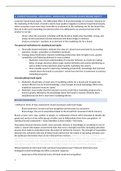Samenvatting
Summary Papers Brand Management | Marketing Management | Tilburg University |
- Vak
- Brand Management
- Instelling
- Tilburg University (UVT)
Summary of all papers of Brand Management Tilburg University written in school year . Contains all papers that are compulsory for the exam.
[Meer zien]




